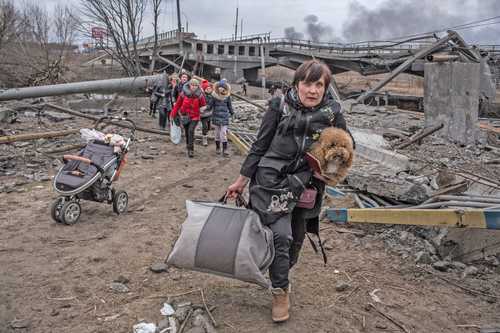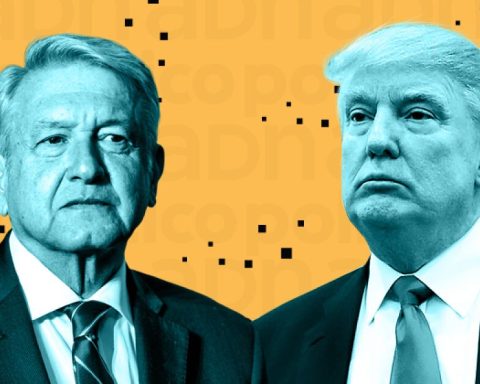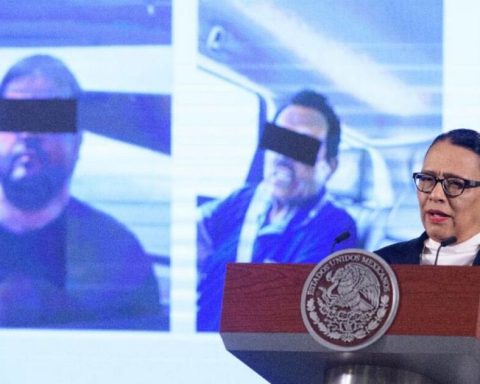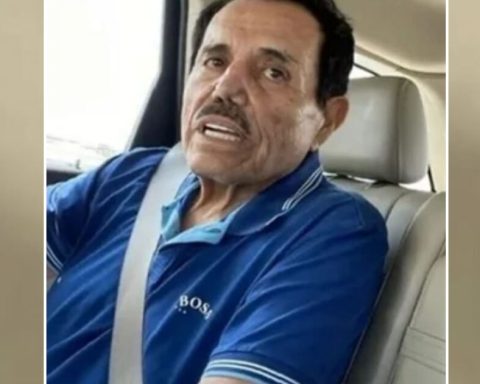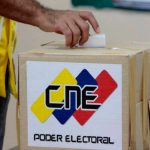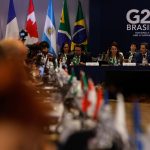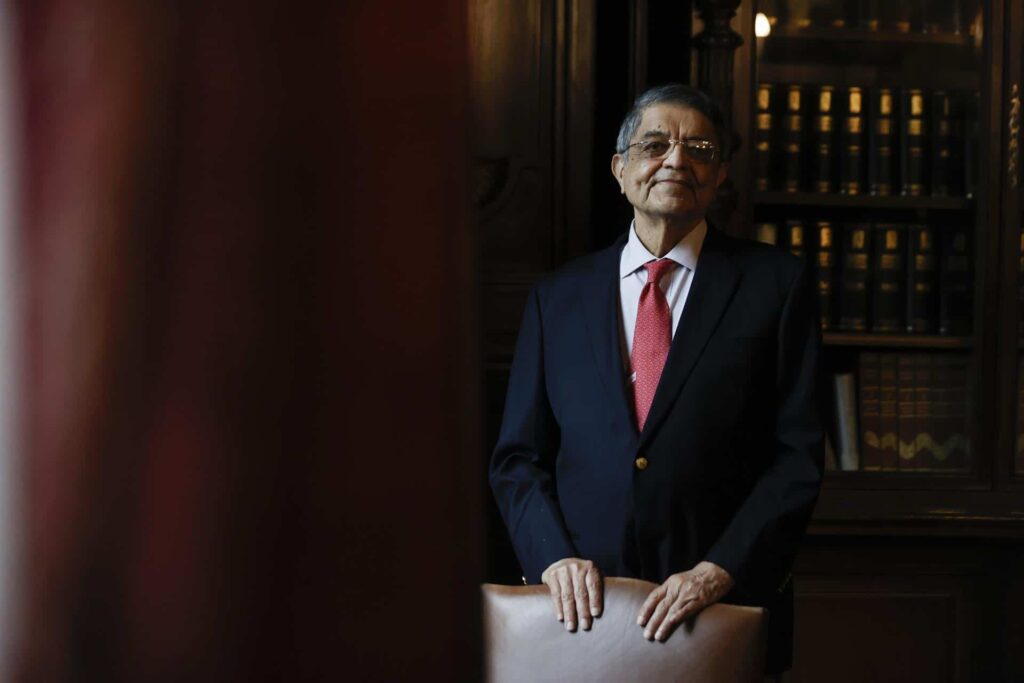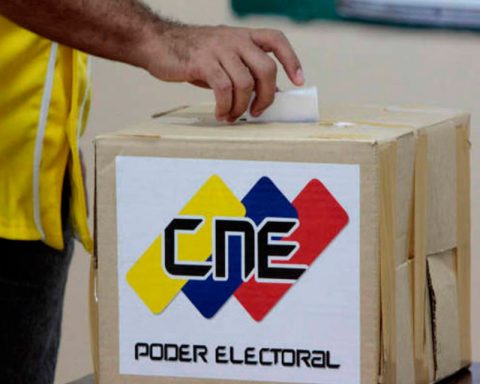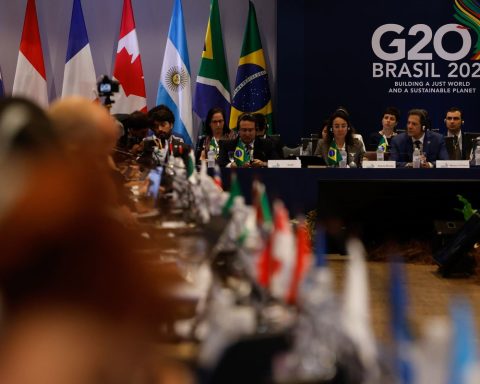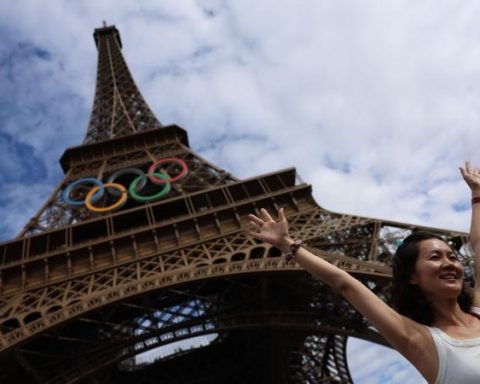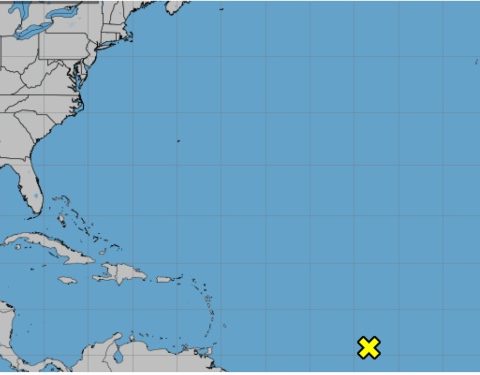▲ Ukrainians leave the city of Irpin -near Kiev- this Sunday through a makeshift path next to a destroyed bridge.Photo App
CJ Polychroniou /I
Newspaper La Jornada
Monday, March 7, 2022, p. 5
Russia’s invasion of Ukraine took much of the world by surprise. It is an unprovoked and unjustified attack, which will go down in history as one of the greatest war crimes of the 21st century, says Noam Chomsky in this interview with Truthout.
Political considerations such as those cited by Russian President Vladimir Putin cannot be used as arguments to justify an invasion against a sovereign nation. However, in the face of this terrible invasion, the United States must choose urgent diplomacy over military escalation, as this would constitute a death sentence for the species, with no victors
Chomsky says.
Noam Chomsky is internationally recognized as one of the greatest living intellectuals. His intellectual stature has been compared to that of Galileo, Newton, and Descartes, and his work has had enormous influence on a variety of areas of academic and scientific research, including linguistics, logic and mathematics, computer science, psychology, the media, philosophy, politics and international affairs. He is the author of some 150 books and has received dozens of prestigious awards, including the Sydney Peace Prize and the Kyoto Prize (Japanese equivalent of the Nobel), as well as dozens of honorary doctorates from the most renowned universities on the planet. . Chomsky is Professor Emeritus at the Massachusetts Institute of Technology and Professor Laureate at the University of Arizona.
Russia’s invasion of Ukraine has taken most people by surprise, sending ripples of panic around the world, though there have been plenty of signs that Putin has been shaken by NATO’s eastward expansion and Washington’s refusal to take seriously the security demands of Red line
regarding Ukraine. Why do you think he decided to launch an invasion at this late date?
–Before answering the question, we must establish some incontestable facts. The most crucial is that the Russian invasion of the Ukraine is a serious war crime, on a par with the US invasion of Iraq and the invasion of Poland by Hitler and Stalin in September 1939, to give just two notable examples. It always makes sense to look for explanations, but there is no justification.
Turning now to the question, many smug opinions have been poured into Putin’s mind. The normal story is that he is trapped in paranoid fantasies, acting alone, surrounded by groveling courtiers such as we know here, in what remains of the Republican Party, pilgrimage to Mar-a-Lago to receive their leader’s blessing.
The avalanche of vituperation may be accurate, but perhaps other possibilities should be considered. Perhaps Putin meant what he and his associates have been saying loud and clear for years. It could be, for example, that since Putin’s main demand is an assurance that NATO will not recruit new members, and specifically not Ukraine or Georgia, there would obviously be no basis for the current crisis if there had not been an expansion of the alliance after the end of the war cold, or if the expansion had occurred in harmony with the creation of a security structure in Europe that included Russia
. The author of these words is the former US ambassador to Russia Jack Matlock, one of the few serious specialists on Russian issues within the diplomatic corps of his country, written shortly before the invasion. He goes on to conclude that the crisis “can be easily resolved by the application of common sense… By any common sense measure, it is in the United States’ interest to promote peace, not conflict. Trying to remove Ukraine from the influence of Russia – the purpose proclaimed by those who have agitated the ‘color revolutions’ – is a futile and dangerous endeavor. Have we forgotten the lesson of the Cuban missile crisis so soon?”
Mattlock is not alone. Much the same conclusions about the underlying issues are reached in the memoirs of CIA director William Burns, another of the real Russia specialists. Diplomat George Kennan’s even more forceful stance has been widely cited of late, also supported by former Defense Secretary William Perry, and, outside the diplomatic ranks, by prominent international relations expert John Mearsheimer and numerous others. figures who belong entirely to the dominant culture.
None of this is dark. Internal US documents, released by Wikileaks, reveal that Bush II’s thoughtless offer to Ukraine to join NATO immediately prompted stern warnings from Russia that an increased military threat would not be tolerated. Which is understandable.
In passing we might take note of the strange concept of the left
which appears regularly when whipping the left
for his insufficient skepticism regarding the kremlin line
.
The fact is, to be honest, we don’t know why the decision was made, even if it was made by Putin alone or by the Russian Security Council, in which he has the leading role. There are, however, some things that we know with relative confidence, including the track record reviewed in some detail by those just cited, who have held high positions in the planning system. In short, the crisis is 25 years in the making, as the United States has dismissively dismissed Russia’s security concerns, particularly its clear red lines: Georgia, and especially Ukraine.
There is good reason to believe that this tragedy could have been prevented, right down to the last minute. We have discussed it before, repeatedly. As to why Putin launched the criminal aggression just now, we can speculate as we like. But the immediate background is not dark: he has evaded, but not refuted.
It is easy to understand why those suffering from this crime may find it an unacceptable distraction to inquire why it happened and whether it could have been prevented. Understandable, but wrong. If we want to respond to tragedy in ways that help victims, and avert the even worse catastrophes that lie ahead, it is prudent, and necessary, to learn as much as we can about what went wrong and how it could have been course corrected. Heroic gestures can be satisfying, but they don’t help.
As has often happened, I am reminded of a lesson I learned long ago. In the late 1960s, I participated in a meeting in Europe with some representatives of the National Front for the Liberation of South Vietnam (vietcong
, in American slang). It happened during that brief period of intense opposition to America’s horrendous crimes in Indochina. Some young men were so furious that they felt that only a violent reaction would be an appropriate response to the monstrosities that were being committed: smashing store windows on the main avenues, throwing bombs at a reserve officer training center. Anything less violent was equivalent to complicity in these terrible crimes. The Vietnamese saw things very differently. They strongly opposed such measures. They presented their model of an effective protest: a few women silently praying at the graves of American soldiers killed in Vietnam. They were not interested in what made American opponents of the war feel righteous and honorable. They wanted to survive.
It is a lesson I have heard in one form or another from victims of appalling suffering in the global south, the prime target of imperial violence. And we must learn it by heart, adapted to the circumstances. Today, it means an effort to understand why this tragedy occurred and what could have been done to prevent it, and apply those lessons to what comes after.
The question goes deep. There is no time to review this crucially important issue here, but the reaction to a real or imagined crisis has repeatedly been to pick up the gun rather than the olive branch. It’s almost a reflex, and the consequences have often been dire… for the traditional victims. It is always worth trying to understand, to take a step or two forward in thinking towards the likely consequences of action or inaction. It is a truism, of course, but it is worth repeating because it is easy to dismiss it in times of justified passion.
The options left after the invasion are bleak. The least bad is to support the diplomatic options that still exist, in the hope of achieving an outcome not too far from what could be achieved a few days ago: an Austrian-style neutralization of Ukraine, some version of Minsk federalism at home. Much more difficult to achieve now. And, necessarily, with an escape hatch for Putin, or the outcomes would be even more dire for Ukraine and everyone else, perhaps in unimaginable ways.
